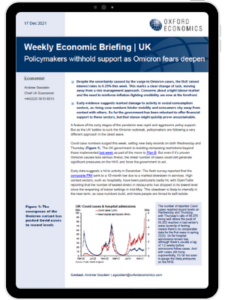Policymakers in the UK withhold support as Omicron fears deepen

Despite the uncertainty caused by the surge in Omicron cases, the BoE raised interest rates to 0.25% this week. This marks a clear change of tack, moving away from a risk management approach. Concerns about a tight labour market and the need to reinforce inflation-fighting credibility are now at the forefront. Early evidence suggests marked damage to activity in social consumption sectors, as rising case numbers hinder mobility and consumers shy away from contact with others. So far the government has been reluctant to offer financial support to these sectors, but that stance might quickly prove unsustainable.
What you will learn:
- The UK government is resisting reimposing restrictions beyond
those implemented last week as part of the move to Plan B. But even if it’s proven Omicron causes less serious illness, the sheer number of cases could still generate significant pressures on the NHS and force the government to act. - Early data suggests a hit to activity in December. The flash survey reported that the composite PMI sank to a 10-month low due to a marked slowdown in services.
- The MPC’s justification for hiking rates centred on the tightness of the labour market, with another strong release this week deemed enough to fulfil the criteria it had previously set for tightening policy.
Tags:
Related research

Post
BoJ likely to end zero interest rates in autumn
As expected, the BoJ maintained its policy rate at 0%-0.1% at Friday's meeting. With more confidence on the ongoing wage-driven inflation dynamics and a strong appetite for policy normalisation, the BoJ looks more likely to end its zero-interest rate policy in the autumn.
Find Out More
Post
Nowcast shows wage growth slowing sharply
Our sentiment data, developed with Penta, suggests that UK private sector wage growth slowed sharply in March and early-April. If official data mirrors our sentiment indicator, it should keep the Monetary Policy Committee on track to cut interest rates in the summer.
Find Out More